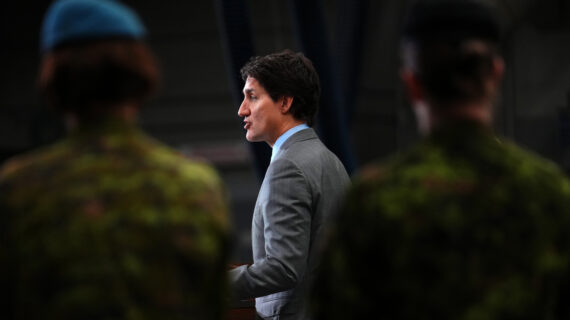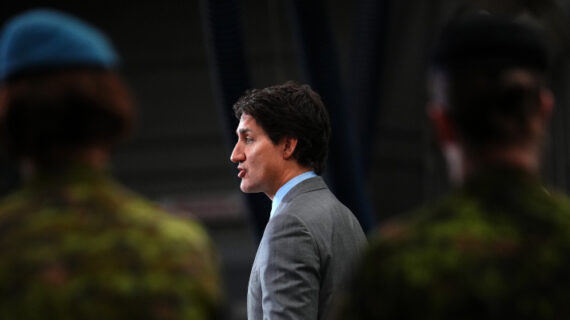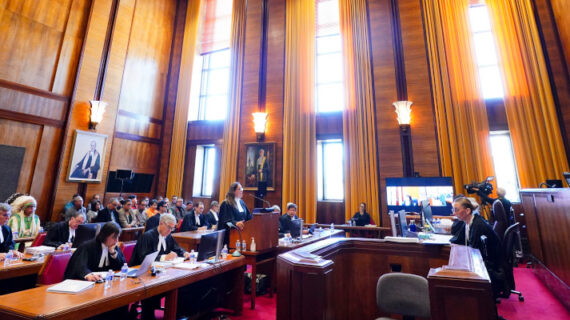- The Bank of Canada raised the benchmark interest rate to its highest level since 2001, leading to criticism from NDP leaders, as well as some pointed comments from Prime Minister Justin Trudeau.
- Conservative strategist and consultant Fred DeLorey says Pierre Poilievre's previous criticisms of the Bank of Canada were proven correct, and that the Bank is not above criticism.
- "Frankly, I don't believe in solutions that come at the expense of the poorest people,” said B.C.’s NDP Premier David Eby last week, about the Bank's rate hikes.
The Bank of Canada was subjected to a round of cross-party criticism last week after it raised the benchmark interest rate to five percent, the highest since 2001, in an attempt to combat inflation.
The Bank is used to taking flak lately, but perhaps not to the current bipartisan consensus.
Criticizing the Bank is nothing new for the Conservative leader Pierre Poilievre, who has promised to fire Governor Tiff Macklem for failing to prevent inflation from rising beyond an annual rate of three percent, or even NDP leader Jagmeet Singh, who has attacked past interest-rate hikes.
Last week, however, even Prime Minister Justin Trudeau chimed in with pointed comments, if not outright criticism, regarding the rate hike.
“This is not the news that any Canadian wanted to receive,” said Trudeau last week at a NATO meeting in Lithuania, although he framed the situation in a global context. “I’ve had conversations with leaders here in Europe and around the world and the cost of living is a real challenge.”
When addressing past interest-rate hikes, Trudeau has often pivoted to touting his government’s financial support for Canadians who are financially struggling, and Canada’s favourable federal debt-to-GDP ratio.
Last week, B.C.’s NDP Premier David Eby went even further than Trudeau by criticizing the Bank’s rate hikes in very plain language.
“We have not seen the full impact yet. People have not renewed their mortgages yet, and the businesses that are struggling under debt have not started going under yet, but they will,” said Eby. “Frankly, I don’t believe in solutions that come at the expense of the poorest people.”
Karamveer Lalh, an Edmonton-based lawyer, wrote in defence of the Bank’s independence for The Hub last year and says his opinion remains unchanged.
“Democratic socialists or social democrats, liberals, conservatives, they all have different ideas as to how to spend public money,” says Lalh. “But then the Bank is there to react to the fiscal changes that each of those governments make to make sure they don’t drive the economy into the ground, or make life completely unaffordable.”
Lalh says Trudeau’s comments were hypocritical after previously labelling Poilievre as irresponsible for his criticisms of the Bank last year. He says the comments and criticisms from Trudeau and Eby were more concerning than anything Poilievre said about the Bank.
“Pierre Poilievre was talking about the Bank not doing its job properly, as per its rule defined by Parliament,” says Lalh, referencing the Bank’s mandate to keep inflation below 3 percent annually. “Trudeau and the NDP premiers, they’re talking about how they don’t think that the Bank of Canada should do its job.”
In 2022, when both Singh and Poilievre were hammering the Bank, albeit for different reasons, Finance Minister Chrystia Freeland said that “institutional stability” was paramount while defending the Bank’s independence. Various commentators in many of Canada’s legacy media outlets attacked Poilievre for his criticisms of the Bank of Canada, labelling him as reckless and dangerous.
Conservative strategist Fred DeLorey, and Erin O’Toole’s former campaign director, has criticized some aspects of Poilievre’s leadership but says Poilievre’s critiques of the Bank of Canada last year had merit.
“(Poilievre) had the foresight to see that there were issues here,” says DeLorey. “He was raising it and he took a lot of grief for it, which we’re now seeing was quite unfair.”
In addition to economic damage due to inflation, hiked mortgage rates are beginning to hit Canadians in other ways. When interest rates were nearly non-existent during the pandemic, many Canadians purchased homes with variable, rather than fixed, mortgage rates, which have since risen to the point of being unaffordable for many new homeowners.

Anthony Koch, who was Poilievre’s press secretary during his successful bid for party leadership, says partisans will only defend institutions when they aid their goals and that the Bank was above criticism for the Liberal government when interest rates aligned with the government’s heightened spending plans.
“I’m not suggesting, in whole or in part, that they were operating in cahoots with one another,” says Koch. “What I’m saying though, is that when the policy pursued by the Bank of Canada was in line with the objectives and the policy objectives of the government of Justin Trudeau, it was all sweet and dandy.”
DeLorey says criticisms of the Bank of Canada were a product of the current inflationary period, and will likely subside when rates return to pre-pandemic levels, but does not believe the Bank should be above criticism.
“We live in a democracy where we should be allowed to criticize these things,” says DeLorey. “They’re not holy grails that we can’t touch, and if these guys are making incredibly important decisions that impact people’s lives, it is totally fair game to be able to criticize them.”




